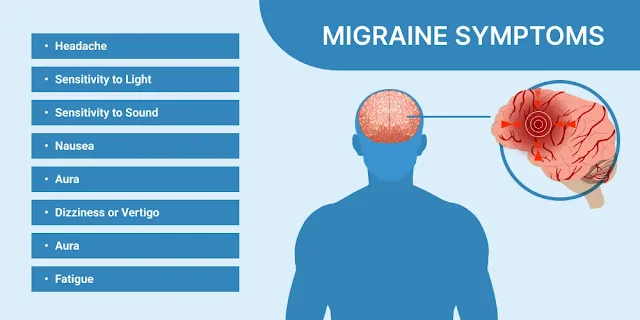🧠 Migraine Pain: Causes, Symptoms, and Proven Treatments That Work
introduction;
Migraines are intense, often disabling headaches caused by neurological and vascular changes in the brain. Common triggers include stress, certain foods, and hormonal changes. Learn about symptoms and the best treatments for managing migraines in 2025.
Migraines are not just headaches—they are a complex and often debilitating neurological disorder affecting millions globally. If you're looking for a detailed guide on what causes migraines, how to recognize the symptoms, and which treatments actually work, this blog post will give you the clarity you need.
✅ What Are Migraines?
Migraines are intense headaches often accompanied by symptoms like nausea, light sensitivity, and visual disturbances. They can last anywhere from a few hours to several days and can seriously disrupt daily activities.
🔍 What Causes Migraine Headaches?
Understanding your triggers is the first step to managing migraines effectively. Here are the main contributors:
🧬 1. Genetics
A family history of migraines significantly increases your risk. Over 60% of migraine sufferers have a genetic link.
🧠 2. Neurological Changes
Abnormal brain activity, affecting pain regulation and blood flow, is believed to be central to migraine development.
💃 3. Hormonal Fluctuations
Changes in estrogen levels, especially during menstruation or menopause, can trigger migraines—affecting women three times more than men.
🌦️ 4. Environmental Triggers
Flashing lights, strong smells, weather changes, and loud noises can all set off migraine episodes.
🍫 5. Dietary and Lifestyle Factors
-
Skipping meals
-
Dehydration
-
Excess caffeine or alcohol
-
Processed foods (cheese, chocolate, MSG)
🚨 Migraine Symptoms to Watch For
Migraines progress through multiple stages, though not everyone experiences each one:
📌 Common Symptoms:
-
Throbbing head pain, usually on one side
-
Nausea and vomiting
-
Sensitivity to light, sound, and smell
-
Aura: Visual disturbances like flashing lights or blind spots
-
Tingling or numbness in the face or limbs
💊 Migraine Treatment: What Really Works?
1. Medications for Acute Relief
These are taken once a migraine starts:
-
Triptans (e.g., sumatriptan)
-
NSAIDs (ibuprofen, naproxen)
-
Anti-nausea drugs (metoclopramide)
2. Preventive Medications
Prescribed for frequent or severe attacks:
-
Beta-blockers (e.g., propranolol)
-
Anti-seizure drugs (e.g., topiramate)
-
Antidepressants (e.g., amitriptyline)
-
CGRP inhibitors – new drugs designed specifically for migraine prevention
🌿 Natural and Lifestyle-Based Treatments
Many migraine sufferers find relief with lifestyle changes and non-medical remedies:
🧘 Stress Management:
-
Meditation, yoga, and cognitive behavioral therapy (CBT)
🍽️ Diet & Nutrition:
-
Avoid known food triggers
-
Stay hydrated
-
Take magnesium, riboflavin (B2), or CoQ10 (only after consulting your doctor)
🛌 Sleep:
Stick to a consistent sleep schedule—both too little and too much sleep can trigger migraines.
🪡 Alternative Therapies:
-
Acupuncture
-
Biofeedback
-
Massage therapy
📅 When to See a Doctor
Seek medical advice if:
-
Migraines increase in frequency or severity
-
OTC medications aren’t effective
-
You experience sudden, intense headaches or new neurological symptoms
A healthcare provider may recommend advanced diagnostics or refer you to a neurologist.
🧾 Summary: Take Charge of Your Migraines Today
| Key Takeaways | Details |
|---|---|
| Major Causes | Genetics, hormones, triggers, environment |
| Symptoms | Throbbing pain, nausea, aura, sensitivity |
| Effective Treatments | Medications, lifestyle changes, alternative care |
| When to Seek Help | Frequent/severe migraines, new symptoms |
Migraines don’t have to control your life. With the right combination of treatment, lifestyle adjustment, and awareness of your personal triggers, you can significantly reduce their impact.
Certainly! Here's a strong, SEO-optimized conclusion for your blog post:
🧠 Final Thoughts: Managing Migraine Pain for a Better Life
Migraines can be a debilitating and frustrating condition, but with the right knowledge and tools, they are manageable. By understanding your personal triggers—whether they’re hormonal, dietary, environmental, or stress-related—you can take proactive steps to prevent future attacks. Combining medical treatments with lifestyle changes, such as maintaining a regular sleep schedule, staying hydrated, and managing stress, offers a comprehensive approach to relief.
If migraines are interfering with your daily life, don’t wait—consult a healthcare provider to explore your options, including newer medications like CGRP inhibitors or natural supplements that may provide lasting benefits.
🧩 Migraine relief isn’t one-size-fits-all, but with patience and a personalized plan, you can regain control and significantly improve your quality of life.
href="https://https://machinemerrimentresent.com/kpy542ijrm?key=374ad52b1da5daf69e0cea67de52cbfc.googleusercontent.com/img/b/R29vZ2xl/AVvXsEi21pE24tkdA8TfZMjs8PXJZQ7cgrRbV_bJ9CYtUkUk0fDrjKEiU5ytW5VcsvrnNl-7PoXCEQ24jjZbsfUuqTtgdoZ7X1ToTZtsSGT275fXoJ4-PbfLeAOnGg5Uub8593C2acmio5g9cL5EKPD3ZxWFqqig4ouBky4BmjZWllpmoSVxXSnfRBi8zttnLUcb/s355/download.jpg" imageanchor="1" style="margin-left: 1em; margin-right: 1em;" target="_blank">

